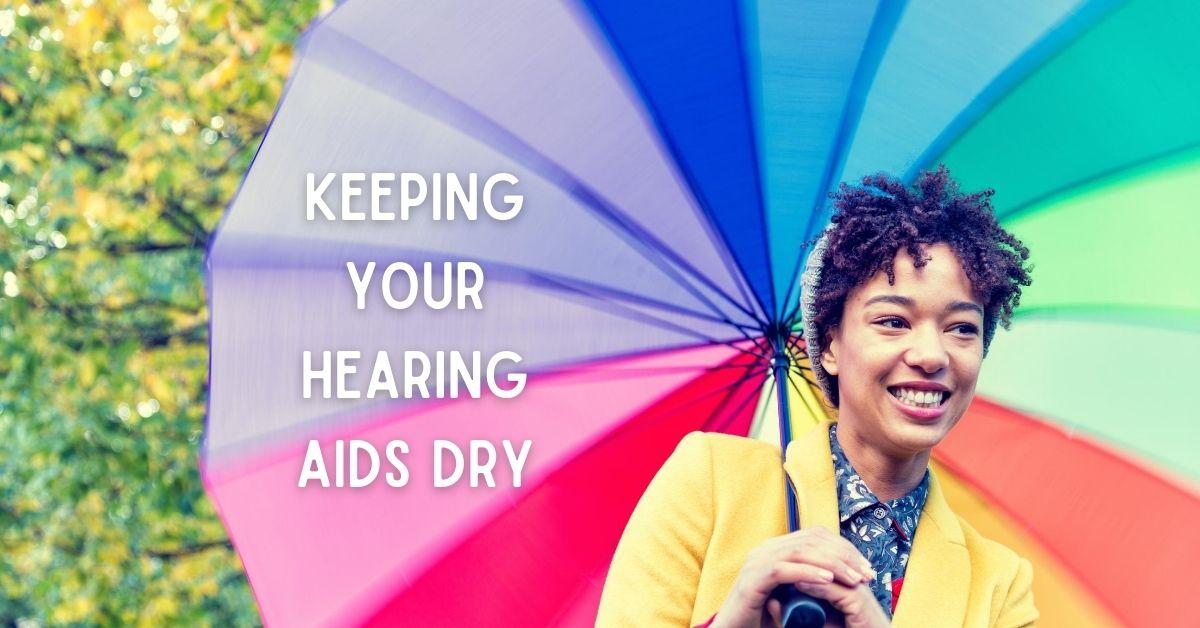One of the benefits of hearing aids is that they enable you to hear no matter where you are. Whether you are taking a walk in the forest or doing your shopping through the town square, hearing aids make it possible to engage with others easily and clearly and also to enjoy the soundscape of the natural world.
However, one of the risks you might have considered when it comes to wearing your hearing aids while out and about is the risk of getting caught in a rainstorm. Similar to carrying our smartphones with us everywhere we go, these devices are useful to have on hand but are sensitive to dampness and humidity, not to mention total immersion in water.
If you drop your hearing aids in water, you might be able to take some steps to save them, but another risk comes from damp, misty, or very humid conditions over time. Let’s take a look at why it’s important to keep your hearing aids dry, how to do so, and what to do if your units accidentally get wet.
Why Hearing Aids Need to be Dry
Two aspects of hearing aids make them particularly sensitive to moisture: electricity and metal. The electrical components that make your hearing aids work can be damaged by water in at least a couple ways.
In one instance, water inside the electrical components can make a connection that should not be there, creating an electrical surge that overwhelms the system. In another instance, it is not exactly water that damages the electrical components but the residue that remains after water has dried.
This accumulation of microscopic impurities can short out a connection that should exist. When it comes to metal internal components of your hearing aids, you might have imagined that rust and corrosion are issues. Just like any metal that is not coated in a waterproof material, moisture can lead to the eventual demise of the metal parts inside hearing aids.
How to Keep Your Hearing Aids Dry
One of the most useful accessories you might consider buying for your hearing aids is a hearing aid dryer. This simple device is designed to periodically dry your hearing aids, particularly when they have been exposed to generally humid conditions. Some dryers are designed to store your hearing aids overnight or whenever they are not in use.
Another simple thing you can do to keep your hearing aids dry is to simply wipe them with a clean, absorptive cloth after use. This will serve the double function of keeping them dry and also keeping them free of debris and dirt.
One household trick that you can do if you have not yet purchased a hearing aid dryer is to store your hearing aids in a resealable plastic bag of dry, uncooked rice. The desiccant quality of the rice can remove humidity or moisture that has accumulated over the day.
As a protective measure, it is also helpful to keep a plastic bag on hand to protect your hearing aids as you are out and about. If you happen to hear thunder, you can place your hearing aids in a waterproof bag to keep them from immersion.
What to Do if Your Hearing Aids Get Wet
If you happen to get caught in a rainstorm without a plastic bag to protect your hearing aids or if you drop your aids in a sink of water, the first thing you will want to do is to wipe them dry with a clean absorptive cloth. Removing the water droplets is a must, so let them sit a moment on the absorptive towel to remove the moisture.
If you have a hearing aid dryer, follow the device instructions for hearing aids that have become wet. If you don’t yet have a dryer on hand, you can try using silica desiccant or that plastic bag of rice to absorb the remaining humidity from inside your units.
If you’re concerned and want support, feel free to call us! Our team might be able to provide recommendations for drying out your particular make and model of hearing aids.
Of course, just as with hearing loss, prevention is the best treatment! Make sure to keep your hearing aids dry and running properly with regular maintenance. Contact us today to learn more!

